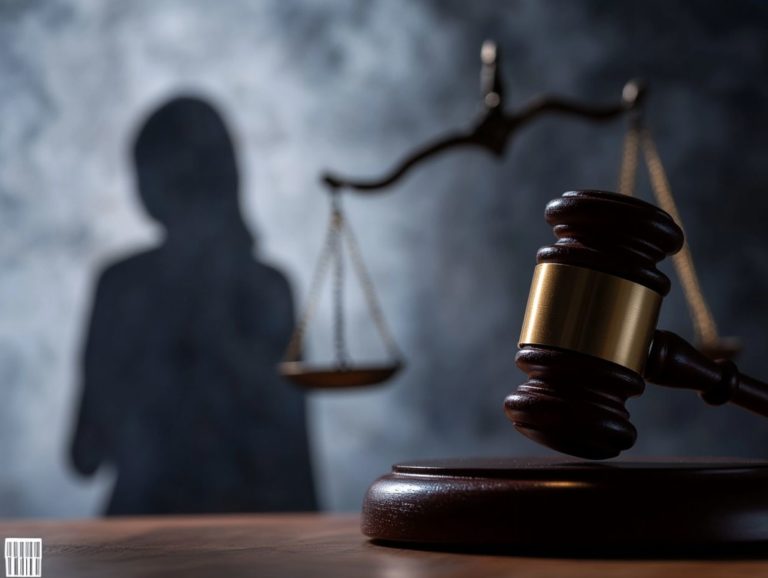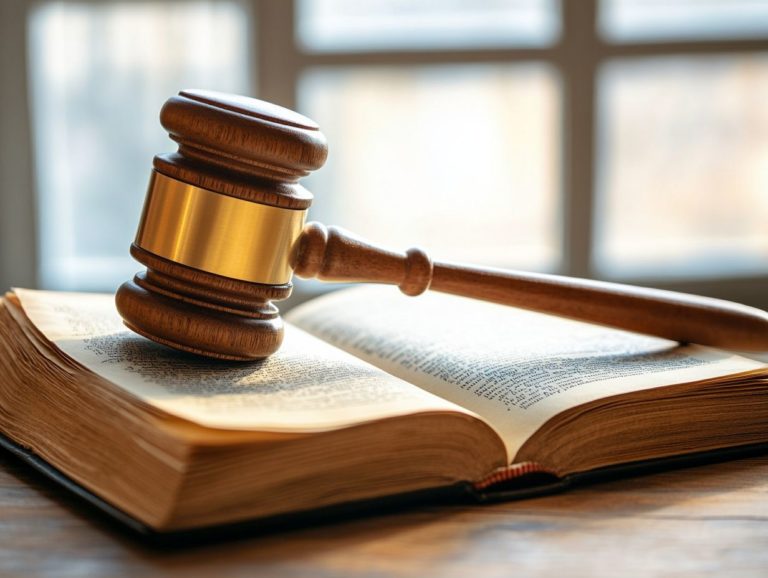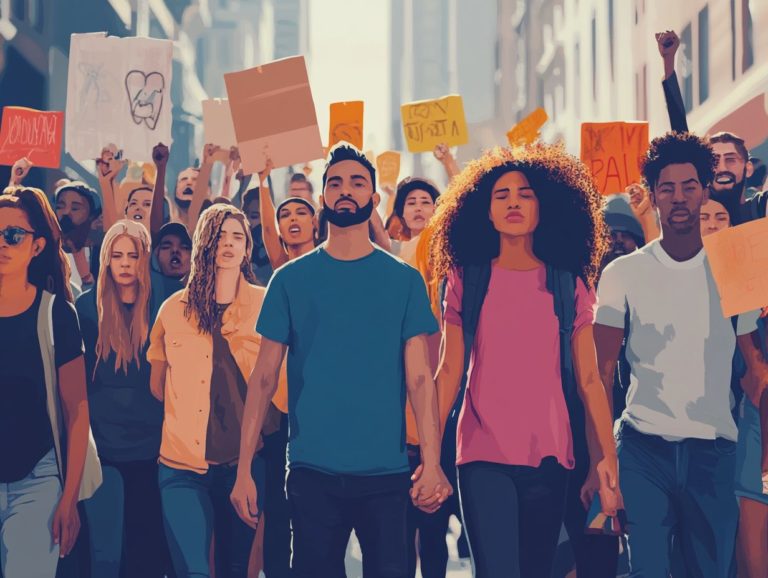The Dynamics of Hate Crimes in Today’s Society
Hate crimes represent a pressing issue that impacts individuals and communities. They affect us on multiple levels and require our immediate attention.
This exploration delves into the definition and various types of hate crimes. It will illuminate the complex factors that lead to their prevalence.
You ll examine the social and political climates that fuel these acts. Understanding the critical steps needed for prevention is essential.
Discover how society can effectively address hate crimes by supporting victims and fostering a culture of inclusion. It s time to take action!
Contents
- Key Takeaways:
- Understanding Hate Crimes
- Factors Contributing to Hate Crimes
- Impact of Hate Crimes
- Preventing Hate Crimes
- Addressing Hate Crimes in Society
- Frequently Asked Questions
- 1. What are hate crimes and how are they defined?
- 2. How prevalent are hate crimes in today’s society?
- 3. What are some common dynamics of hate crimes?
- 4. Who are the most commonly targeted groups in hate crimes?
- 5. What are the long-lasting impacts of hate crimes on victims and communities?
- 6. What can be done to address and prevent hate crimes in our society?
Key Takeaways:
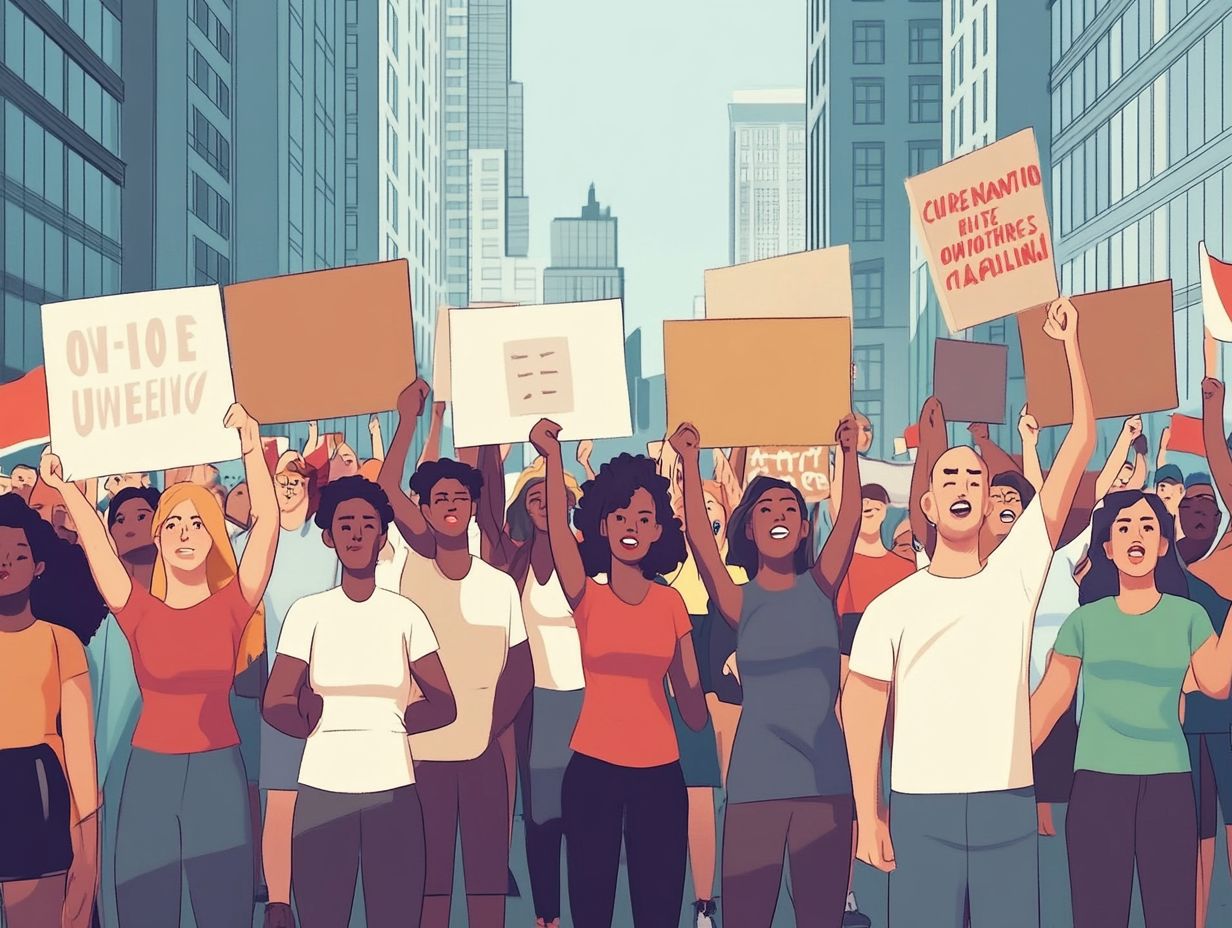
Hate crimes are criminal acts driven by bias. These acts target individuals or groups based on characteristics like race, religion, and sexual orientation.
The social and political climate, along with individual and group dynamics, contribute to the occurrence of hate crimes. We need education, legislation, and support to prevent and address them.
Understanding Hate Crimes
Understanding hate crimes is essential for navigating the complexities of bias-related offenses in the United States. The FBI defines hate crimes as offenses directed at individuals or groups based on perceived traits like race, religion, sexual orientation, and gender identity.
Law enforcement agencies are intensifying efforts to track hate crime statistics. This aims to grasp the prevalence of these incidents and enhance transparency in crime reporting.
The Crime Data Explorer serves as a valuable resource. It illustrates data on hate crimes and highlights the ongoing issues of discrimination and hate-based violence.
Definition and Types
Hate crimes are criminal offenses driven by bias against a person’s perceived characteristics. These can include race, religion, and sexual orientation.
They can take many forms, including physical assault, vandalism, or verbal harassment. Each type has distinct implications for victims and their communities.
When bias is involved, the consequences extend beyond immediate harm. They can instill fear within entire communities, creating a pervasive sense of insecurity.
For instance, racial hate crimes may target individuals based on ethnicity. Similarly, attacks motivated by religious bias can threaten places of worship.
Crimes targeting sexual orientation not only harm individuals but also perpetuate harmful stereotypes. This shows how these crimes interact with societal norms.
Factors Contributing to Hate Crimes
Factors contributing to hate crimes are woven into the social and political fabric of your community. They significantly impact the occurrence and severity of hate-based violence.
As societal tensions rise, you may notice an increase in hate crimes. This is often fueled by widespread discrimination and the blaming of marginalized groups.
To address the root causes, it s crucial to understand the categories of bias motivation. These arise from a complex interplay of cultural, economic, and political factors.
Victimization can become more pronounced during social unrest. This underscores the urgent need for intervention.
Social and Political Climate
The social and political climate profoundly influences the frequency of hate crimes. Legislative measures like the Hate Crimes Prevention Act play an important role in shaping public perception and law enforcement responses.
These laws are crafted not just to impose stronger penalties on those convicted of hate crimes, but also to send a resounding message: intolerance has no place in society. The effectiveness of such legislation can be compromised by political rhetoric that surrounds these issues, as divisive statements from leaders can embolden individuals harboring hateful ideologies, potentially leading to an uptick in incidents.
Social movements advocating for equality and justice can serve as a counterbalance. They cultivate environments where inclusivity is championed and hate crimes are unequivocally condemned. Grasping this dynamic is essential for assessing the broader implications for community safety and social cohesion.
Individual and Group Dynamics
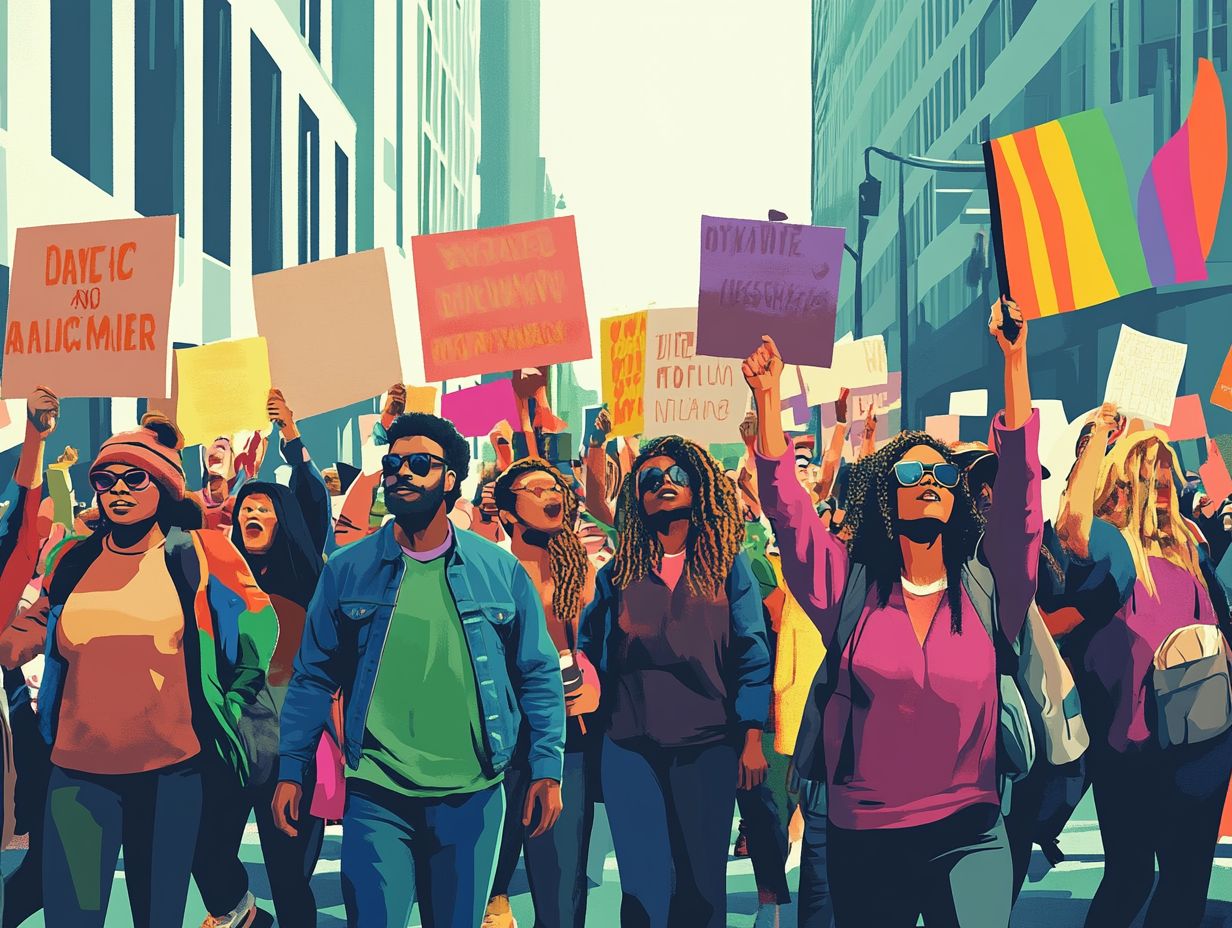
Individual and group dynamics play a critical role in the perpetration of hate crimes. Social identity fosters an ‘us versus them’ mentality that fuels prejudice.
This mindset can make you see others as less than human if they don t share your views, nurturing a sense of superiority within specific social groups. Psychological factors, such as unresolved anger or personal insecurities, can push individuals to seek validation through aggressive behavior against perceived outsiders.
Affiliation with particular groups can further amplify these discriminatory beliefs. These groups might engage in rituals or discussions that reinforce a shared identity steeped in hate, where venting frustrations evolves into an acceptance of violence as a form of expression.
This interplay between personal psychological factors and group dynamics creates a fertile ground for actions rooted in intolerance, highlighting the intricate complexities driving hate crime motivations.
Impact of Hate Crimes
The impact of hate crimes resonates deeply within both victims and their communities. They result in psychological trauma, weakened community bonds, and increased fear among marginalized groups.
Victims frequently endure severe emotional and physical repercussions that extend well beyond the initial harm. As communities confront the aftermath, the ripple effects can erode social trust and inclusivity.
We must act now with a strong plan to tackle these consequences. A comprehensive approach fully acknowledges the long-term effects of hate crimes on individuals and the wider community.
Effects on Victims and Communities
The impact of hate crimes on victims is deeply significant. They inflict immediate harm and long-lasting psychological distress, leading to a sense of alienation from the community.
Victims often struggle with emotional trauma, which can reveal itself as anxiety, depression, or even post-traumatic stress disorder. This can dramatically alter their daily lives and relationships.
The physical injuries they endure can range from minor wounds to serious, life-altering disabilities. Such injuries intensify their feelings of vulnerability.
Consequently, these individuals often face profound social isolation, withdrawing from communities they perceive as unsafe or unwelcoming. This isolation doesn’t just affect the victims; it creates a ripple effect throughout the community.
Ultimately, this cultivates an atmosphere of heightened discrimination, fear, and tension among different groups. It undermines the very fabric of social cohesion and mutual respect that holds society together.
Preventing Hate Crimes
Preventing hate crimes requires a comprehensive strategy. This strategy encompasses education, awareness campaigns, and strong legislation designed to tackle prejudice and hate-driven violence.
Join us in these efforts to make our society safer and more inclusive for everyone.
Education and Awareness
Education and awareness are essential tools in the fight against hate crimes. They provide you and your community with the insights needed to recognize and confront discrimination.
Numerous initiatives have emerged to enhance this understanding. Workshops and seminars shed light on the realities of hate crimes and their broader societal implications.
Many schools implement programs that highlight the importance of diversity and foster meaningful dialogues around empathy and respect for differences.
These awareness campaigns are vital in cultivating an inclusive environment. They create a space for discussions that effectively dismantle biases.
By equipping individuals with important information, these initiatives foster understanding and empower communities to unite against hatred, ultimately nurturing a safer and more accepting society.
Legislation and Law Enforcement
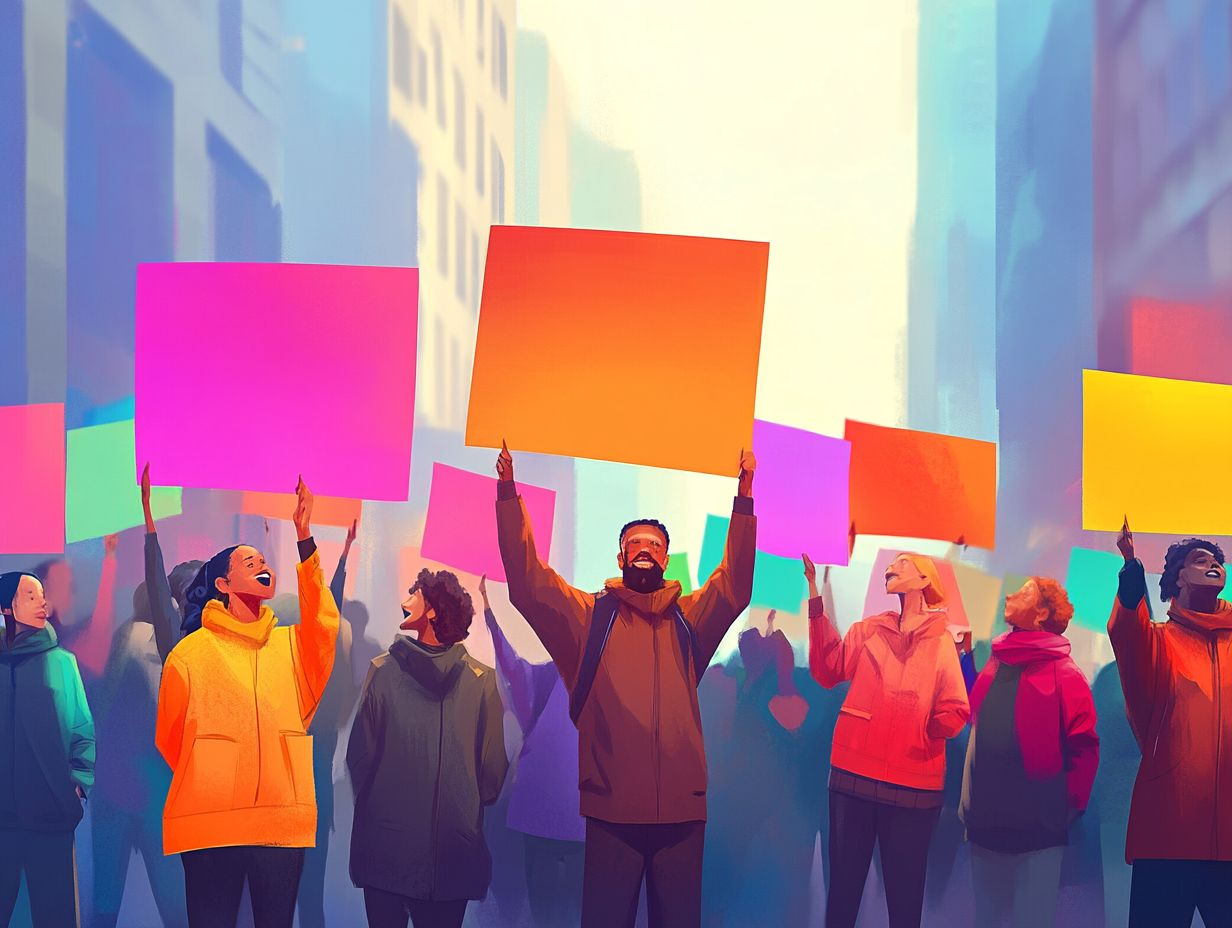
Strong laws, such as the Hate Crimes Prevention Act, are crucial for giving power to law enforcement agencies to tackle hate crimes effectively. With comprehensive crime reporting and data collection, it sets the stage for meaningful action.
By establishing clearer definitions and rigorous reporting protocols, this act becomes an essential tool in addressing the increasing prevalence of these offenses. It provides the framework required for law enforcement to better identify and categorize hate crimes a vital step toward ensuring accountability.
To enhance their effectiveness, agencies should prioritize training programs that emphasize the ability to understand and respect different cultures. This equips officers with the essential skills needed to navigate sensitive situations with empathy and professionalism.
Securing adequate funding for resources significantly improves the response to hate crimes. This not only fosters a safer environment for marginalized groups but also strengthens community trust and cohesion.
Addressing Hate Crimes in Society
Addressing hate crimes in society necessitates a unified commitment to support victims and champion inclusion. By doing this, you play a crucial role in cultivating a culture rooted in tolerance and understanding.
Supporting Victims and Promoting Inclusion
Supporting victims of hate crimes is essential for their recovery and reintegration into communities. It helps them build resilience against future discrimination.
By providing a comprehensive array of support systems, such as tailored legal assistance and dedicated mental health resources, you can help create safe spaces for those affected.
Legal experts can guide victims through the complex process of reporting incidents and pursuing justice. Meanwhile, mental health professionals offer vital counseling to aid individuals in processing their trauma.
Community initiatives are crucial in promoting inclusion and combating discrimination. They strengthen social ties and foster understanding among diverse groups.
These programs educate the public and empower individuals to take action against hate, cultivating a culture of acceptance and support that significantly aids in healing.
Frequently Asked Questions
1. What are hate crimes and how are they defined?
Hate crimes are criminal acts motivated by prejudice and discrimination against a particular group based on race, religion, sexual orientation, gender identity, disability, or other characteristics. They are defined as crimes committed against an individual or group because of their perceived membership in a certain group.
2. How prevalent are hate crimes in today’s society?
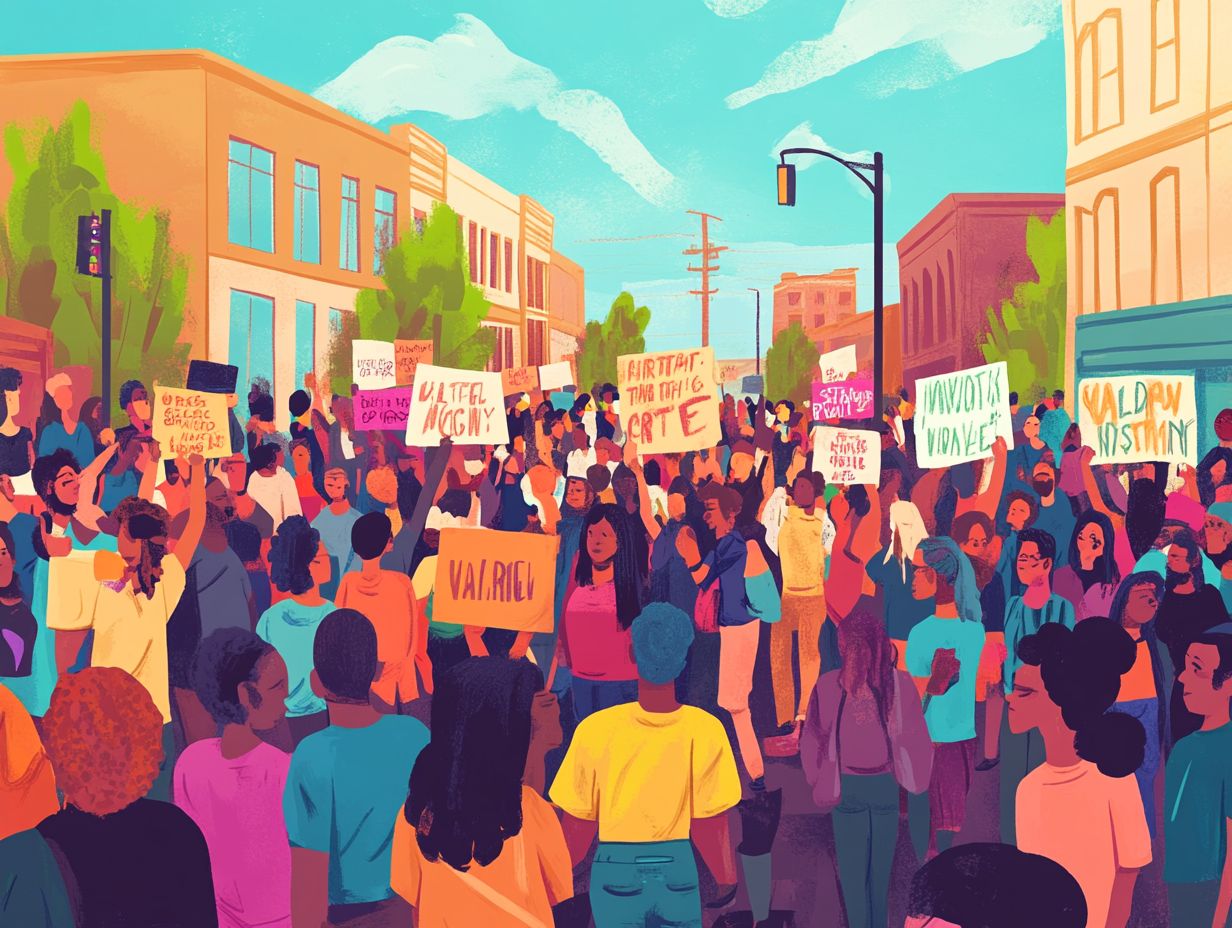
Hate crimes continue to be a serious problem in today’s society. According to the FBI, there were 7,120 hate crime incidents reported in 2018, and this number has been increasing over the past few years.
3. What are some common dynamics of hate crimes?
Hate crimes often involve violence or threats aimed at vulnerable individuals or groups. Their intent is to intimidate or terrorize a community, stemming from deep-seated prejudice fueled by ignorance and fear.
4. Who are the most commonly targeted groups in hate crimes?
Racial and ethnic minorities, religious groups, and LGBTQ+ individuals are often targeted in hate crimes. However, anyone can be a victim, including those discriminated against based on gender, age, or disability.
5. What are the long-lasting impacts of hate crimes on victims and communities?
Hate crimes cause physical harm and emotional trauma to victims. They also create fear and division, erode trust, and perpetuate discrimination within communities.
6. What can be done to address and prevent hate crimes in our society?
To tackle hate crimes, we need a multi-faceted approach. This includes enforcing stricter laws, promoting diversity education, and encouraging dialogue among different groups.
We must also support marginalized communities and advocate for changes to address the root causes of prejudice and discrimination.

